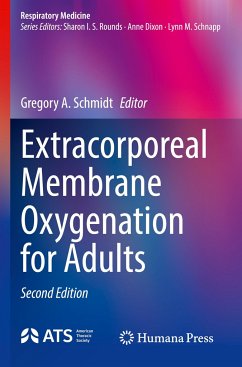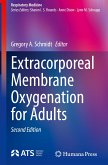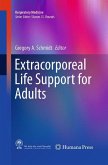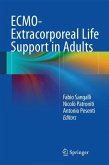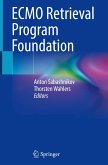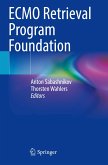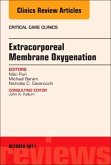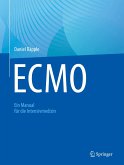This new edition presents an evidence-based review of extracorporeal membrane oxygenation (ECMO) for adults, with a particular focus on veno-venous (VV) ECMO. Due to the dramatic impact of COVID-19, the number of institutions offering ECMO, thus the number of clinicians performing ECMO (or referring their patients for ECMO), has exploded in a truly unprecedented way. While the pandemic may fade, programs built in response will survive by extending the application of ECMO to previously overlooked populations.
This fully updated second edition refines its focus to VV ECMO, which has seen the most dramatic increase and relevance. This allows expert authors to go further in depth regarding VV ECMO and provide readers with better guidance from the physiology of VV ECMO to weaning and decannulation. Several areas have been expanded, including anti-thrombotic approaches; how to set the mechanical ventilator and judge the complex interactions between patient, ventilator, and ECMO circuit; assessing the systemic circulation during VV ECMO (especially right ventricular function and intravascular volume); and recognizing membrane lung dysfunction. Finally, new chapters addressing how the VV-capable clinician should think about VA ECMO and how to incorporate ethical principles in patient selection and withdrawal of ECMO have been added.
This is an ideal guide for intensive care and respiratory medicine specialists, fellows training in critical care, ECMO specialist staff, perfusionists, nurses, and respiratory therapists.
This fully updated second edition refines its focus to VV ECMO, which has seen the most dramatic increase and relevance. This allows expert authors to go further in depth regarding VV ECMO and provide readers with better guidance from the physiology of VV ECMO to weaning and decannulation. Several areas have been expanded, including anti-thrombotic approaches; how to set the mechanical ventilator and judge the complex interactions between patient, ventilator, and ECMO circuit; assessing the systemic circulation during VV ECMO (especially right ventricular function and intravascular volume); and recognizing membrane lung dysfunction. Finally, new chapters addressing how the VV-capable clinician should think about VA ECMO and how to incorporate ethical principles in patient selection and withdrawal of ECMO have been added.
This is an ideal guide for intensive care and respiratory medicine specialists, fellows training in critical care, ECMO specialist staff, perfusionists, nurses, and respiratory therapists.

